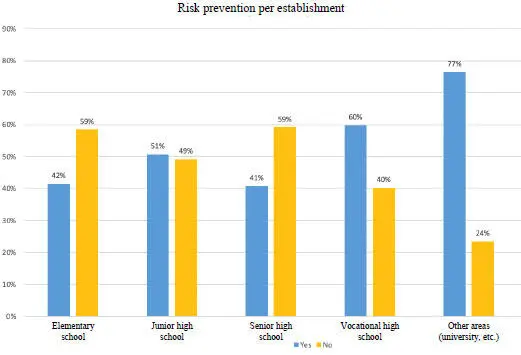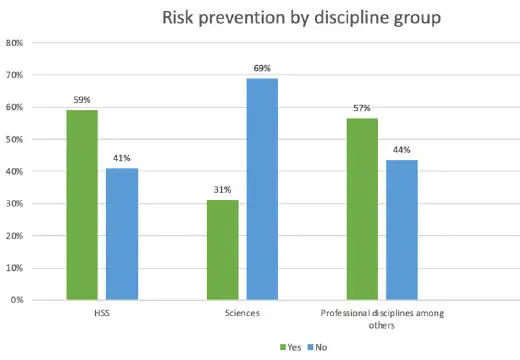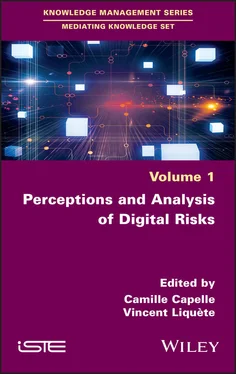The feeling of losing control over certain misuses by students is clearly an obstacle to digital literacy. Teachers feel that digital practices put them at risk and cannot work out how to avoid these misuses or educate students on responsible use.
Through testimonies, we can experience the complexity of this subject, the impact of depictions of digital risks and the role they play on emotions: fear of wrongdoing, fear of not knowing how to teach digital literacy, fear of generating problems for students or of encountering problems with students themselves.
1.4.2. When perceptions of risk freeze practices
For a large majority of teachers, digital technology is not just dangerous. Many of them perceive the pedagogical advantages of certain practices with students, but do not necessarily follow through for various perceived reasons: the procedural heaviness of complying with institutional expectations, a lack of resources, meaning that not all students can use the technology and a lack of time to respond to all the ministerial injunctions in the first years of practice (program, education, training, etc.).
Generally speaking, digital technology in schools is also synonymous with promises that are proclaimed and not always kept:
What intrigued me is that the theory is great but the practice is quite complicated, because in fact we don’t have the means on site to implement what we would like to be able to do (fourth-grade schoolteacher, 23 years old).
And those who try the experience do not necessarily do it again:
We had worked on the method and so on, and then the computer system crashed, as they say, so we lost all our work, but for me it is not only the technical aspect that slows everything down, but actually the procedural and almost institutional aspect too. We are asked to operate in a very precise way that does not necessarily correspond to the reality of the field and the needs of the students. Nor to the needs of the teachers either, for that matter (English teacher in a high school, age 25).
However, beyond operational constraints and feasibility for implementation, risk perceptions also influence the frequency that digital media is used in the classroom, as expressed by this mathematics teacher, who feels that it generates social inequalities:
Everything that concerns the use by the students is excessively time-consuming, it requires an enormous amount of preparation time for an unsatisfactory result. Or else, for it to be satisfactory, it would have to be the only thing done, and this is absolutely impossible in terms of resources, in terms of time and in terms of interest… there are many disparities. Because the students don’t necessarily have access to a computer at home, they don’t necessarily have access to the Internet... and the work is not necessarily important enough for them to do it on their own (math teacher in a senior high school, age 31).
For this fourth-grade teacher, it is more the cognitive and psychosocial risks that generate apprehension:
If it’s to do a little bit of math practice etc., you know, at very specific times, then yes, but not so that it takes over because they have so many screens around them that over-stimulate them in the morning before going to school and then in the evening. I have the results of the number of hours spent on the screens, it’s enormous and we see that they are tired, that they are agitated […] society wants to show them video games, names of famous people, footballers, etc. When they write a story, they are not able to see the names of the people they are watching. When they write a story, they have trouble detaching themselves from that, and I’m a little worried about that, and I’ve been able to discuss it with older teachers, who agree without saying “let’s go back to the good old days” and all that, but they’ve seen the evolution, and I spotted it after a year or so, right away (fourth-grade schoolteacher, 23 years old).
We note that these teachers very often evoke the practice and the manipulation of the tools by completely omitting the educational and cultural approach related to the digital environment:
This approach to the use of digital tools is not yet something that is extremely valued from the point of view of entrance examinations to engineering schools (physics and chemistry teacher in a senior high school, 30 years old).
The training of students with digital technology even seems to be part of a prestige scale for teachers, in this case at the bottom of it, compared to what can be taught in the school curriculum.
Some teachers even consider that specific courses on digital uses should be given, and therefore almost excluded from the scope of their duties, in their view:
I really deplore the fact that computer science is not a separate subject in France. Separated from technology, I mean. Or that there are many more hours of technology and therefore many more teachers and that there is a part exclusively on computer science (English teacher in a senior high school, 37 years old).
Another expressed the idea that students are not at the level to be able to learn with digital technology in their discipline, since they have not mastered the basics:
I think we should even start by training them in the use itself, because ¾ of the students who are in high school, they don’t know how to use Word or Excel properly, or the Internet either. All they know how to do is search in the space bar and go watch videos and stuff. They don’t know how these things really work and when you try to show them, they say, “No, we know how to do it”. But that’s not true (English teacher in a senior high school, age 37).
There is a conflict among teachers between those, on the one hand, who perceive digital literacy as an accompaniment to a technical mastery of digital tools, and those, on the other hand, who envisage a cross-disciplinary and cultural education that covers all areas. We can feel the distress of these teachers who feel that they are at a dead end when it comes to integrating digital literacy into their teaching:
Everyone does a little bit of what they want to do, or what they can do (math teacher in a senior high school, 49 years old).
Finally, it should be noted that half of survey respondents (52.8%) stated that they do not carry out digital risk prevention with students, while a slightly lower figure (47.2%) said they do. This distribution reflects the divide within the profession, which seems to be partly linked to the level of education (greater awareness in junior high school and vocational high schools) and the disciplines (greater awareness in the humanities and social sciences and vocational disciplines).

Figure 1.1. Distribution of respondents addressing digital risks by institution

Figure 1.2. Distribution of respondents addressing digital risks by disciplinary group
1.4.3. When risk perceptions lead us to consider them in order to overcome them
The proportion of teachers who say they consider digital risks when educating students do so by addressing various topics. This mainly concerns the protection of personal data and the privacy of students (89.2%) and the rights to an image (67.3%). This awareness is often linked to cyberbullying issues that regularly cause problems in schools (Stassin 2019). There is therefore a strong emphasis on ethical, legal and psychosocial risks.
Читать дальше














